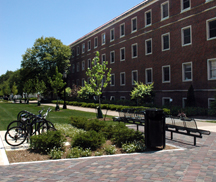Planned Harrison-Hillenbrand rain garden to boost Purdue's stormwater sustainability
October 23, 2012
 |
|
Stadium Mall contains permeable pavement that allows
storm water to be directly absorbed into the ground. |
Groundbreaking for a rain garden between Harrison and Hillenbrand halls will help mark Green Week's focus for today (Oct. 23), water sustainability.
The rain garden will become part of a larger storm water sustainability system that is being implemented on the West Lafayette campus.
Purdue depends on wells on campus for its water supply. To prevent ground water contamination, a wellhead protection area is maintained throughout campus. Since rainfall and storm water runoff recharge the ground water, it is important that these sources are allowed to permeate the ground, and in the case of storm water runoff, to be cleaned beforehand.
In 2009, Purdue developed a campus-wide Sustainable Stormwater Modification Design. This document has guided changes to the University's storm water treatment practices. Through this process, University officials learned that a storm water system is most effective when it consists of a number of smaller storm water treatments, such as permeable pavement, bio-swales and rain gardens.
Permeable pavement allows storm water to be absorbed on-site before it has the opportunity to become runoff water that will require cleaning. These pavements typically are made of asphalt and concrete and have been installed at the Horticulture Building, the Black Cultural Center parking lot, the Armory parking lot, Stadium Mall and Nelson Hall.
When storm water cannot be absorbed directly on-site, it must go through a cleaning process. Bio-swales and rain gardens can serve this purpose. Bio-swales are sloped landscapes that typically are planted with native grasses and herbaceous plants; this vegetation filters, cleanses and slows down storm water runoff before redirecting it to another location, such as a storm water inlet. Examples of bio-swales can be found at Pao Hall, Discovery Park, the Ross-Ade Stadium parking lot, Mackey Arena, and the Northwest Athletics Complex.
Rain gardens collect storm water runoff using native plants that can tolerate excess water, cleanse the water and encourage the water to infiltrate the ground. A rain garden is on the south side of Hanley Hall. Another is under construction on the north side of the Horticulture Building.
Faculty, staff and students are invited to attend the groundbreaking ceremony for the planned Harrison-Hillenbrand rain garden at 3 p.m. between the Harrison and Hillenbrand halls. The groundbreaking also will celebrate the receipt of Ford Motor Company's $50,000 College Community Challenge grant. The grant will be used to implement water sustainability projects on campus and throughout the community.
Writer: Rebecca Terry, 49-46916, rlterry@purdue.edu
